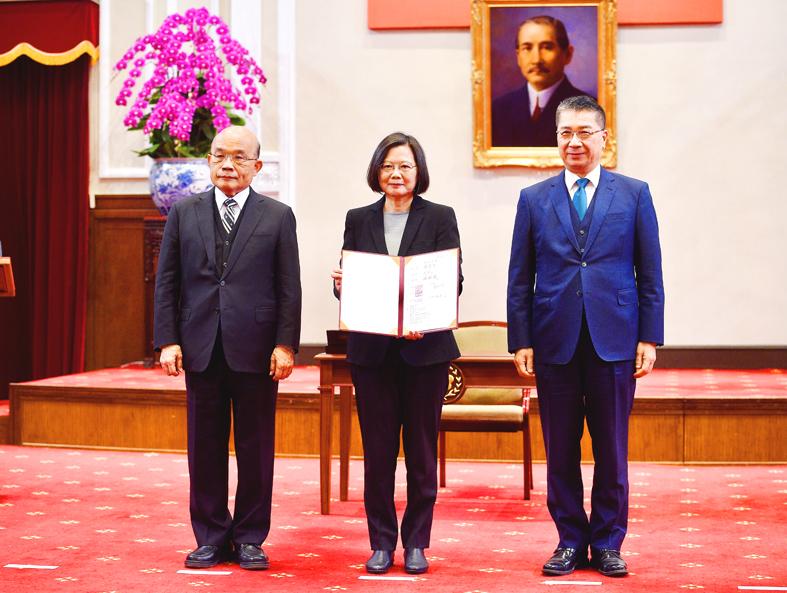President Tsai Ing-wen (蔡英文) yesterday signed into law the Stalking and Harassment Prevention Act (跟蹤騷擾防制法), which increases the punishments for stalking and harassment.
Speaking at a news conference attended by Premier Su Tseng-chang (蘇貞昌), Minister of the Interior Hsu Kuo-yung (徐國勇), and Democratic Progressive Party (DPP) lawmakers Ker Chien-ming (柯建銘), Kuan Bi-ling (管碧玲) and Fan Yun (范雲), Tsai said the act would offer better protection to victims of stalking and harassment.
The act was passed by lawmakers across party lines and is to take effect in six months, she said.

Photo: Peter Lo, Taipei Times
“The act is an important first step toward the prevention of gender-based violence,” Tsai said.
Tsai also highlighted the murder of Peng Wan-ru (彭婉如), a former director of the DPP’s Women’s Affairs Department and feminist advocate, as the day before the promulgation was the 25th anniversary of her death. The case remains unsolved.
Peng’s death increased awareness of the need to protect women, spurring the introduction of dedicated legislation.
“We believe we will do more and better along the way,” Tsai said.
The act, passed by the Legislative Yuan on Nov. 19, defines stalking and harassment as continuous or repeated actions that are related to sex or gender, frighten the victim and have negative effects on their daily lives.
It defines eight types of behavior as stalking or harassment, including spying, trailing, following, approaching, threatening, insulting and harassment over the Internet.
It also covers pursuing a relationship in an inappropriate manner, sending unsolicited messages, video clips or other objects by mail, tarnishing a person’s reputation and using their identity to buy goods.
The act stipulates a prison sentence of up to one year and a fine of up to NT$100,000 for those found guilty of any of those acts.
Perpetrators who additionally carry a dangerous weapon can be sentenced to a maximum of five years in prison and/or a fine of up to NT$500,000.

SHIPS, TRAINS AND AUTOMOBILES: The ministry has announced changes to varied transportation industries taking effect soon, with a number of effects for passengers Beginning next month, the post office is canceling signature upon delivery and written inquiry services for international registered small packets in accordance with the new policy of the Universal Postal Union, the Ministry of Transportation and Communications said yesterday. The new policy does not apply to packets that are to be delivered to China, the ministry said. Senders of international registered small packets would receive a NT$10 rebate on postage if the packets are sent from Jan. 1 to March 31, it added. The ministry said that three other policies are also scheduled to take effect next month. International cruise ship operators

HORROR STORIES: One victim recounted not realizing they had been stabbed and seeing people bleeding, while another recalled breaking down in tears after fleeing A man on Friday died after he tried to fight the knife-wielding suspect who went on a stabbing spree near two of Taipei’s busiest metro stations, Taipei Mayor Chiang Wan-an (蔣萬安) said. The 57-year-old man, identified by his family name, Yu (余), encountered the suspect at Exit M7 of Taipei Main Station and immediately tried to stop him, but was fatally wounded and later died, Chiang said, calling the incident “heartbreaking.” Yu’s family would receive at least NT$5 million (US$158,584) in compensation through the Taipei Rapid Transit Corp’s (TRTC) insurance coverage, he said after convening an emergency security response meeting yesterday morning. National

PLANNED: The suspect visited the crime scene before the killings, seeking information on how to access the roof, and had extensively researched a 2014 stabbing incident The suspect in a stabbing attack that killed three people and injured 11 in Taipei on Friday had planned the assault and set fires at other locations earlier in the day, law enforcement officials said yesterday. National Police Agency (NPA) Director-General Chang Jung-hsin (張榮興) said the suspect, a 27-year-old man named Chang Wen (張文), began the attacks at 3:40pm, first setting off smoke bombs on a road, damaging cars and motorbikes. Earlier, Chang Wen set fire to a rental room where he was staying on Gongyuan Road in Zhongzheng District (中正), Chang Jung-hsin said. The suspect later threw smoke grenades near two exits

The Forestry and Nature Conservation Agency yesterday launched a gift box to market honey “certified by a Formosan black bear” in appreciation of a beekeeper’s amicable interaction with a honey-thieving bear. Beekeeper Chih Ming-chen (池明鎮) in January inspected his bee farm in Hualien County’s Jhuosi Township (卓溪) and found that more than 20 beehives had been destroyed and many hives were eaten, with bear droppings and paw prints near the destroyed hives, the agency said. Chih returned to the farm to move the remaining beehives away that evening when he encountered a Formosan black bear only 20m away, the agency said. The bear